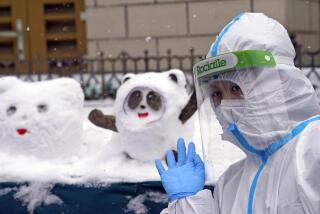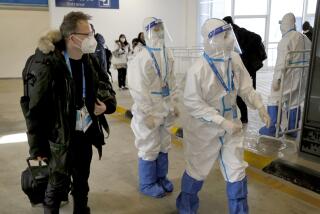The Endless Cold War: Clearly, It’s Not to Be Sneezed At
The cause of my recent absence was a common cold. Common but dreadful and unrelenting. It persisted for two weeks. And now, two weeks later, I am still annoyed by its lingering symptoms.
The first day I went to see my doctor. I know doctors are peculiarly ineffectual against the common cold. But I was afraid it would go into pneumonia and carry me off.
The doctor prescribed a decongestant and an antibiotic. One week later I called him and told him I had used all the drugs and was no better. He prescribed another decongestant and another series of antibiotics. I suspect the theory is that I would feel better if I thought I was doing something.
As I say, I am not over it yet, but the worst symptoms have subsided. I can breathe occasionally and my voice is back.
What puzzles me is why, in this age of miraculous technology, science can’t cure the common cold. I concede that medical researchers are right to concentrate on such devastating diseases as infantile paralysis and cancer, but it seems that the common cold could be vanquished with just a minimum effort. Maybe the problem is that it’s so common .
My bible in matters of health, “The American Medical Assn. Family Medical Guide,” offers little comfort. “All of us get colds,” it says. “The disease we call the common cold is really a group of minor illnesses that can be caused by any one of almost 200 different viruses.”
The thought of one person trying to fight off 200 viruses reminds me of those old swashbucklers in which Errol Flynn held off half a dozen swordsmen with his trusty broadsword.
The book notes that “Colds are far less frequent in isolated communities, where everyone soon becomes immune to the viruses that are in circulation. An outbreak of colds is apt to follow the arrival of strangers.”
That may explain the legendary hostility of small towns toward traveling salesmen and other strangers. Also, it is another of the many good reasons for moving from the metropolis to the sticks.
Since my wife had a cold a week before I came down, I naturally blamed her for mine. Not necessarily so, says a new book, “You Know What They Say” by Alfie Kohn (Harper Collins), which undertakes the demolition of many cherished myths.
First, it says, colds are probably not caused or worsened by exposure to cold. In one experiment 49 convicts who had been infected with a cold virus sat around in their underwear in 40-degree temperature for two hours, or were immersed in cold water; no more caught colds than those of a control group, and their colds were no more severe.
That should be enough to discourage scenario writers from including that tiresome sequence in which some hapless character is accidentally exposed to an extended bout of cold--usually through someone else’s perfidy--and goes through the next few reels talking through a stopped-up nose and sneezing.
Other experiments have been inconclusive as to whether the virus is transmitted by air or by touch. In one particularly repulsive experiment, infected subjects were asked to blow their noses into their hands and then touch the hands of 15 uninfected subjects who had to touch their noses. Eleven of the 15 got colds. On the other hand, when 22 subjects were coughed at, sneezed at and breathed on for several minutes by infected people, only one caught cold.
Contrary to belief, the virus is not easily transmitted by kissing. “Of 16 people who smooched for at least a full minute with an infected individual, only one caught a cold. The mouth, as subsequent tests showed, is a far less efficient route of transmission than the nose.”
In one experiment some students were infected, then made to play poker with a control group for 12 hours, breathing each other’s breath and handling the same cards. Then some of the students were prevented from touching their noses, but they caught colds anyway. Then some were prevented from breathing the common air, but were allowed to touch their noses. None of these caught cold.
An editorial on this experiment in the British medical journal The Lancet concluded, “For the moment it looks as though coughs do spread these diseases more often than sticky fingers.”
I can’t see that that experiment proved anything, but it certainly must have been a miserable poker game.
Most of these experiments are conducted with either convicts or students as subjects, probably because both are thought to be in no position to protest.
As for the mythical efficacy of chicken soup, experiments have not shown that this trusted panacea will cure the common cold; but what the heck, it can’t hurt.
Meanwhile, perhaps the most reliable advice is in the common adage: “Treat a cold and it’ll go away in seven days; don’t treat it and it’ll take a week.”
I treated mine twice. Maybe that’s why it lasted two weeks.
More to Read
Sign up for Essential California
The most important California stories and recommendations in your inbox every morning.
You may occasionally receive promotional content from the Los Angeles Times.










